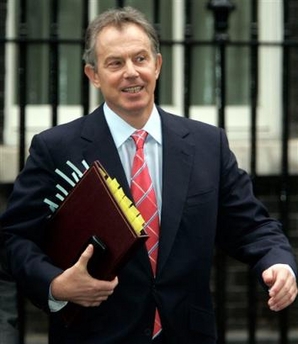|
Europe owers to meet on Iran nuke program
(AP)
Updated: 2006-01-12 19:46
The British, French and German foreign ministers meet
Thursday to agree on a response to Iran's resumption of nuclear activities, with
Britain's prime minister saying the West likely will push to refer a defiant
Tehran to the U.N. Security Council.

Britain's Prime Minister Tony Blair leaves 10 Downing Street
for his weekly Prime Minister's Questions in the House of Commons in
London, Wednesday Jan. 11, 2006. [AP] |
International impatience with Iran has grown since the country broke U.N.
seals on its uranium enrichment plant Tuesday and said it was resuming nuclear
research after a two-year freeze. The decision increased worries in the United
States and other Western countries that Iran intends to produce nuclear weapons,
while Russia, a longtime Iran ally, also expressed disappointment.
Enriched uranium can be used as a fuel for both nuclear energy and nuclear
weapons. Iran says its nuclear program is only for fuel.
At stake as the foreign ministers gather is their countries' two-year
diplomatic effort to persuade Iran to halt its uranium conversion and enrichment
activities.
A last-ditch round of European-Iranian talks had been scheduled for Jan. 18,
but German Deputy Foreign Minister Gernot Erler said Wednesday that the
Europeans cannot continue negotiating with Iran unless it pledges not to enrich
uranium.
British Prime Minister Tony Blair told Parliament Wednesday that Iran's
latest move, coupled with a string of anti- Israel remarks by the country's new
president, "cause real and serious alarm right across the world."
"I think the first thing to do is to secure agreement for a reference to the
Security Council, if that is indeed what the allies jointly decide, as I think
seems likely," Blair said.
The three countries have been negotiating with the backing of the United
States, which has been seeking Tehran's referral to the Security Council.
"I think the next step will be probably to go before the U.N. Security
Council," Vice President Dick Cheney told Fox News radio Wednesday. If that
happens, Cheney said, sanctions "would be probably the number one item on the
agenda."
Russia and China, both members of the International Atomic Energy Agency
board that would have to approve referring Iran to the Security Council, have
previously opposed the idea.
However, the Foreign Ministry in Moscow said Wednesday that Russia and the
United States share "a deep disappointment over Tehran's decision to leave
behind the moratorium on all activities tied with uranium enrichment."
China on Thursday urged more talks, without saying whether it would back
taking Tehran to the Security Council.
China "hopes that all parties concerned can exercise restraint and resolve
this within the IAEA framework and through peaceful negotiations," Foreign
Ministry spokesman Kong Quan said in Beijing. "We firmly believe this serves the
interests of all parties concerned."
Iranian President Mahmoud Ahmadinejad vowed to press ahead with the nuclear
program.
"Unfortunately, a group of bullies allows itself to deprive nations of their
legal and natural rights," he said. "I tell those superpowers that, with
strength and prudence, Iran will pave the way to achieving peaceful nuclear
energy."
"The Iranian nation is not frightened by the powers and their noise," he
said.
|